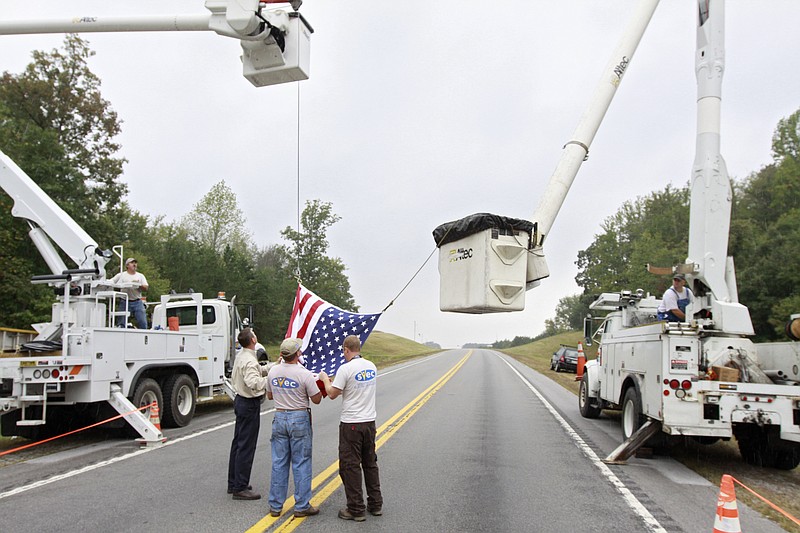NASHVILLE - For at least 20 years, no one apparently realized Tennessee lawmakers had changed state law to give rural electric cooperatives a temporary, four-year property tax break on their investments in new facilities and plants.
But the state's 23 nonprofit rural power distributors certainly do now. And after discovering the provision earlier this year - and with at least two co-ops already invoking it and more expected to follow - the legal and political sparks are flying.
Panicky county mayors and property assessors fear it will put a damper on local tax collections. The behind-the-scenes tussle went public last week when Tennessee Attorney General Herbert Slatery III issued a legal opinion saying the law is unconstitutional.
Slatery said the nonprofit co-ops don't fall into any of the Tennessee Constitution's authorized property tax exemptions. These include government, certain nonprofit groups like churches and charitable organizations, and elderly homeowners.
Sen. Bill Ketron, R-Murfeesboro, said he asked for the opinion after Rutherford County's mayor and property assessor raised concerns.
"Middle Tennessee Electric, I guess, is the largest electric co-op in the state, probably in the country," Ketron said. "They're headquartered in Murfreesboro and they have plans to build a new headquarters. It was going to be a huge chunk of money that [Property Assessor Bob Mitchell] wasn't going to be able to collect on."
He estimated the amount of forgone taxes at $70,000.
Slatery's legal opinion took the co-ops by surprise, although officials already knew they were in a fight.
"I was expecting [property assessors] to come after us legislatively. I was already preparing for that," said David Callis, executive director of the Tennessee Electric Cooperative Association. "I was not expecting the attorney general's route."
He said even co-ops didn't know the tax break was on the books.
"For the past 20-plus years we essentially overpaid our ad valorem taxes because no one knew about it," Callis said.
When co-op officials realized the law existed, though, they had a legal obligation to use it, he said.
"Our board members have a fiduciary duty to keep the electric rates as low as possible for our members," said Callis, who pointed out that officials chose not to seek reimbursement for taxes paid in past years.
"Our guys looked at it and decided this tax has been paid. The counties, the communities, have used this money and we're not going to try to go back and retrieve money we did not legally have to pay."
And now? Callis is shrugging off Slatery's legal opinion, saying co-ops are not planning on changing their tax submissions for new investments made over the past year or going forward.
"As you know," Callis said, "the attorney general's opinion is just that; it's an opinion. It doesn't have the weight of law."
The matter is already before the State Board of Equalization, a panel where property tax disputes are heard.
That's where McNairy and Smith county mayors and property assessors went, taking exception to efforts by Pickwick Electric Cooperative in Selmer and Upper Cumberland Electric Cooperative in Carthage to claim the exemption for their new headquarters buildings.
Their attorney is Bobby Lee, former general counsel for the state comptroller's office. Lee said Saturday he was as surprised as anyone to learn of the temporary tax break.
Slatery's opinion, he noted, "supports our position."
Both sides are waiting for the administrative law process to play out, but Callis and Lee indicated whoever loses will probably march straight into court.
Callis estimated the 23 co-ops collectively pay about $60 million in property taxes annually. Not everything would qualify for the temporary tax break, he said, citing items such as vehicles. And he stressed that the tax break lasts only four years on eligible new investments. But it would help their customers because the power distribution equipment and facilities are costly, he said.
Ketron said Slatery's opinion should help with whatever legal action is taken. And if need be, Ketron said, he's prepared to sponsor legislation to strike the exemption from state code.
Efforts to reach officials with two Chattanooga-area co-ops, South Pittsburg-based Sequachee Electric Cooperative and Decatur-based Volunteer Electric Cooperative, were unsuccessful last week.
The dispute doesn't affect Chattanooga, which is served by city-owned EPB.
Tennessee's nonprofit rural cooperatives and municipal electric distributors were created in the 1930s under President Franklin D. Roosevelt's New Deal, which also saw the creation of the Tennessee Valley Authority.
The cooperatives' purpose was to help provide low-cost power to rural areas that for-profit utilities had ignored, Callis said.
He said the president of the Pickwick Electric Cooperative in West Tennessee discovered the four-year tax break when he began reading the state's enabling legislation shortly after he was named. He saw it, went to his accountant and there it was.
The temporary exemption was created either in 1988 or 2005, according to a state code citation.
Callis and Lee each sought out former Sen. Bob Rochelle, D-Lebanon, who sponsored the law as part of what appears to be a major rewrite of the rural electric cooperative code.
But Rochelle, an attorney, told them he didn't recall the provision. There's speculation it might have been offered as a floor amendment to the bill. At any rate, state officials didn't catch it and it's never been included on tax forms.
Contact Andy Sher at asher@timesfreepress.com, 615-255-0550 or via twitter at AndySher1.
